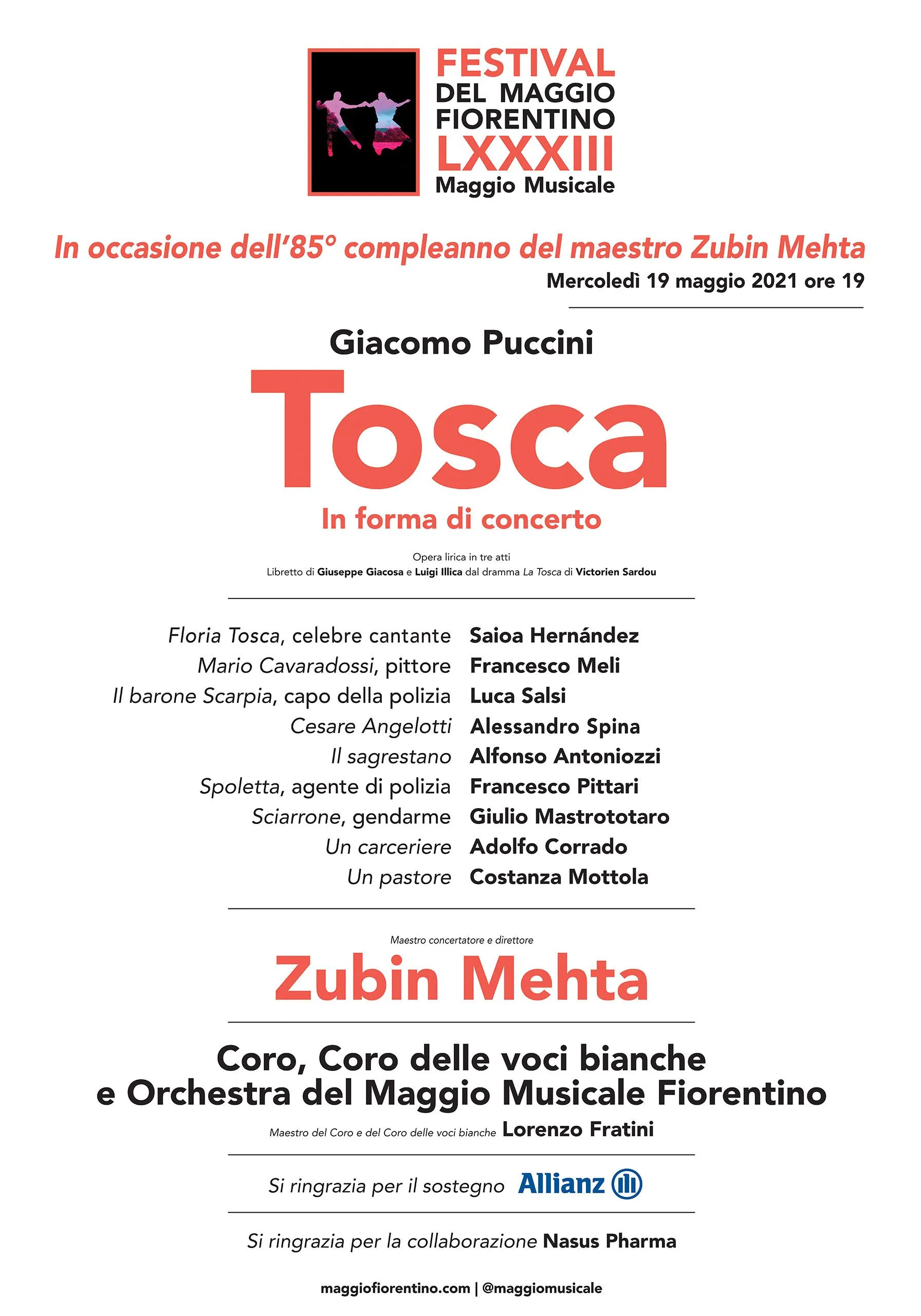In occasion of the 85th birthday of maestro Zubin Mehta
Tosca - In a concert form
Programma
We kindly ask the audience to please read the COVID-19 informations about tickets and seats
An extraordinary 'unscheduled' on the occasion of Maestro Zubin Mehta's 85th birthday: Tosca in concert form, opera by Giacomo Puccini, with the great voices of Saioa Hernández, Francesco Meli and Luca Salsi in the main roles.
-
Thanks to Allianz for the support

Thanks Nasus Pharma for the collaboration
-
On January 14, 1900 at the Teatro Costanzi in Rome, Tosca made its debut, an opera in three acts by Giacomo Puccini to a libretto by Luigi Illica and Giuseppe Giacosa. The source is Victorien Sardou's historical drama La Tosca, written in 1887 specifically for actress Sarah Bernhardt. Puccini was inflamed for that subject after attending a theatrical performance and did everything he could to turn it into an opera. However, the Ricordi publisher initially entrusted the project to another composer, Alberto Franchetti, only to then put it back in the hands of Puccini in 1895. To make Tosca's libretto, the Illica-Giacosa tandem, already successfully tested in La bohème, was reconfirmed. But the work proceeds slowly and with numerous complaints from the librettists. Both consider Sardou's drama unsuitable for operatic transposition due to too many events that prevail over poetry. Puccini, on the other hand, for his part does not care and following only his musical intuition in 1899 he signs what will soon become another of his great masterpieces. Tosca is therefore a work of action where the tension never relaxes and in which the musical discourse must necessarily proceed without stopping, with rare exceptions. This leads the composer from Lucca to adopt a narrative technique based on a dense network of short and recurring motifs - often combined with each other - to comment on the frenetic unfolding of the story. The action is set in papal Rome at the time of the battle of Marengo. The protagonists Floria Tosca, passionate and strong-willed prima donna squared, and her lover Mario Cavaradossi, a painter with liberal and convinced anticlerical sympathies, are hindered by Baron Scarpia, chief of the Bourbon police at the service of the papacy. Animated by murky passions and innate evil, the baron, like a sadistic puppeteer, determines the course of events from start to finish. Fierce persecutor of Mario first, and of Tosca then, (until he is murdered by the woman after an attempted violence) Scarpia continues to hover like a ghost in the orchestra even when dead with the repetition of his threatening theme built on the tritone, the sinister interval that has been associated with Evil in music for centuries. But the dramatic atmosphere of the story, which includes three violent deaths on stage (a stabbing, a shooting and a suicide), is further accentuated by Puccini also through an orchestral writing full of dissonances and tensions, which anticipate the expressionist aesthetics, and a voice often exasperated and pushed to the limit.
An extraordinary 'unscheduled' on the occasion of Maestro Zubin Mehta's 85th birthday: Tosca in concert form, opera by Giacomo Puccini, with the great voices of Saioa Hernández, Francesco Meli and Luca Salsi in the main roles.
-
Thanks to Allianz for the support

Thanks Nasus Pharma for the collaboration
-
On January 14, 1900 at the Teatro Costanzi in Rome, Tosca made its debut, an opera in three acts by Giacomo Puccini to a libretto by Luigi Illica and Giuseppe Giacosa. The source is Victorien Sardou's historical drama La Tosca, written in 1887 specifically for actress Sarah Bernhardt. Puccini was inflamed for that subject after attending a theatrical performance and did everything he could to turn it into an opera. However, the Ricordi publisher initially entrusted the project to another composer, Alberto Franchetti, only to then put it back in the hands of Puccini in 1895. To make Tosca's libretto, the Illica-Giacosa tandem, already successfully tested in La bohème, was reconfirmed. But the work proceeds slowly and with numerous complaints from the librettists. Both consider Sardou's drama unsuitable for operatic transposition due to too many events that prevail over poetry. Puccini, on the other hand, for his part does not care and following only his musical intuition in 1899 he signs what will soon become another of his great masterpieces. Tosca is therefore a work of action where the tension never relaxes and in which the musical discourse must necessarily proceed without stopping, with rare exceptions. This leads the composer from Lucca to adopt a narrative technique based on a dense network of short and recurring motifs - often combined with each other - to comment on the frenetic unfolding of the story. The action is set in papal Rome at the time of the battle of Marengo. The protagonists Floria Tosca, passionate and strong-willed prima donna squared, and her lover Mario Cavaradossi, a painter with liberal and convinced anticlerical sympathies, are hindered by Baron Scarpia, chief of the Bourbon police at the service of the papacy. Animated by murky passions and innate evil, the baron, like a sadistic puppeteer, determines the course of events from start to finish. Fierce persecutor of Mario first, and of Tosca then, (until he is murdered by the woman after an attempted violence) Scarpia continues to hover like a ghost in the orchestra even when dead with the repetition of his threatening theme built on the tritone, the sinister interval that has been associated with Evil in music for centuries. But the dramatic atmosphere of the story, which includes three violent deaths on stage (a stabbing, a shooting and a suicide), is further accentuated by Puccini also through an orchestral writing full of dissonances and tensions, which anticipate the expressionist aesthetics, and a voice often exasperated and pushed to the limit.
Artists
Conductor
Zubin Mehta
Tosca
Saioa Hernández
Mario Cavaradossi
Francesco Meli
Il barone Scarpia
Luca Salsi
Cesare Angelotti
Alessandro Spina
Sagrestano
Alfonso Antoniozzi
Spoletta
Francesco Pittari
Sciarrone
Giulio Mastrototaro
Un carceriere
Adolfo Corrado
Un pastorello
Costanza Mottola
Chorus, Children choir and Orchestra del Maggio Musicale Fiorentino
Children Choir and Chorus Master
Lorenzo Fratini
Zubin Mehta
Tosca
Saioa Hernández
Mario Cavaradossi
Francesco Meli
Il barone Scarpia
Luca Salsi
Cesare Angelotti
Alessandro Spina
Sagrestano
Alfonso Antoniozzi
Spoletta
Francesco Pittari
Sciarrone
Giulio Mastrototaro
Un carceriere
Adolfo Corrado
Un pastorello
Costanza Mottola
Chorus, Children choir and Orchestra del Maggio Musicale Fiorentino
Children Choir and Chorus Master
Lorenzo Fratini
Running Time
Atto I: 50 minuti - Intervallo: 30 minuti - Atto II e Atto III: 1 ora e 10 minuti - Durata complessiva: 2 ore e 30 minuti circa
Tickets
Maggio Theater
Locandina




